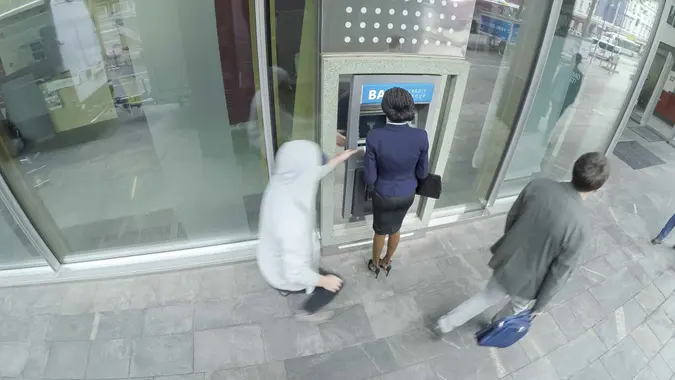What Is ‘Bank Jugging’? 15 Safety Tips To Protect Yourself This Tax Season

Commitment to Our Readers
GOBankingRates' editorial team is committed to bringing you unbiased reviews and information. We use data-driven methodologies to evaluate financial products and services - our reviews and ratings are not influenced by advertisers. You can read more about our editorial guidelines and our products and services review methodology.

20 Years
Helping You Live Richer

Reviewed
by Experts

Trusted by
Millions of Readers
The world’s first ATM debuted in London in 1967, and ever since then ATM users have been advised to be on the lookout for would-be thieves. Nearly 60 years later, robberies involving ATM transactions — known as “bank jugging” — are still a problem, and that’s especially true during tax season.
“Bank jugging” is the term used to describe a criminal act in which thieves observe people making bank or credit union withdrawals — usually at an ATM — and then follow them to a location where they can steal the cash. The term “jugging” refers to a jug that is typically used to carry large amounts of money, according to the Credit Union of Colorado.
Bank Jugging On the Rise Around Tax Season
As NewsNation recently reported, police are warning the public about bank jugging this tax season. Bank and ATM customers are advised to stay alert when cashing their tax refund checks.
“As we move into the heart of tax season and folks start cashing their refund checks or withdrawing refund money from their bank accounts, we want to remind the public to stay vigilant!” the Arlington, Texas, police department wrote in a March 20 Facebook post. “Jugging is a crime of opportunity where thieves look for people leaving banks or ATMs with large sums of cash and then follow them, hoping to find an opening to steal that money.”
Jugging crimes take place all over the country, with “dozens of cases” being reported from Virginia to Texas and California, NewsNation reported. For example, police in Fairfax County, Virginia, have investigated at least 10 incidents over the past year.
These are not petty crimes, either. Thieves allegedly stole $20,000 from a woman in Riverside, California, Inside Edition reported. In a separate but similar incident in Virginia Beach, a Wells Fargo customer said she was swindled out of $33,000 moments after withdrawing cash, according to NewsNation.
“These are dangerous crimes,” Lt. Derek Green of the Burbank (California) Police Department previously told KTLA News. “You usually have somebody driving a vehicle. Oftentimes, you have somebody that’s actually inside the bank posing as a customer themselves, and they’re in communication with each other, so they’re keeping close eyes on their victims.”
The best way to avoid being a victim of bank jugging is to stay vigilant when visiting a bank or ATM. Here are 15 safety tips to protect your money and yourself:
- Avoid making transactions at ATMs in isolated locations with nobody nearby.
- Be mindful of your surroundings when visiting a bank or ATM.
- Take note of people who hang around in the bank lobby or parking lot.
- If you visit a bank or ATM regularly, vary your routine so would-be thieves won’t be waiting for you.
- Don’t wear earbuds or talk on your phone while making ATM withdrawals.
- Choose parking spaces that maximize your visibility to bank employees and customers.
- Conceal your cash in a purse or other item before leaving the ATM and avoid displaying or counting it in public.
- Whenever possible, use drive-through services.
- Be cautious of strangers who approach you or engage with you before and after visiting a bank or ATM.
- If you deal in large sums of cash, request a safety escort from your bank or credit union.
- Use digital banking whenever possible to make transactions.
- Don’t leave large amounts of cash in your vehicle.
- If you believe you are being followed, call 911 or drive/walk to the nearest police of fire/EMS station.
- Avoid making multiple transactions at the same ATM.
- If you are suspicious of someone standing right behind you at the ATM, cancel your transaction and walk away.
 Written by
Written by  Edited by
Edited by 

























